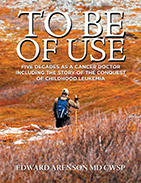
 |
To Be of Use: Five Decades as a Cancer Doctor Including the Story of the Conquest of Childhood Leukemia
by Edward Arenson MD CWSP
Xlibris
This extraordinary memoir details the life of an oncologist over nearly fifty years. Beginning with his undergraduate studies in English and art history, the author describes his first calling to pediatrics with a 1973 fellowship in hematology-oncology at Children's Hospital in Denver. Childhood leukemia was the most common pediatric cancer at the time and was always fatal. Arenson then served in the U.S. Army Medical Corps in Augusta, Georgia, which proved to be a culture shock for the self-described Yankee Jew.
From 1976-1982, Arenson continued training as a post-doctoral fellow at UCLA and then headed back to New York's Albany Medical College (1982-88) as Head of Pediatric Hematology-Oncology. In 1996, the author transitioned into adult neuro-oncology, with a burgeoning interest in brain tumors. He initiated the Center for Brain and Spinal Tumors and a multidisciplinary annual conference, which has formulated care plans for approximately 6,000 patients. Most recently, Arenson has specialized in hyperbaric oxygen medicinal therapy.
Making his already incredible medical memoir further appealing, Arenson includes several professionals along his journey. He pays special tribute to them as being "mensches"—people of integrity and honor. Among these is C. Everett Koop, who was seminal in changing the paradigm for cancer treatment from palliation (focused on symptom control) to intent to cure. Arenson's decision to discuss how his "Jewishness" influenced his medical career proves enlightening. The author additionally reflects on his interest in birding, which began in 1973, alongside that first fellowship in pediatric cancer. "You can understand how a person like me," writes Arenson, "dealing daily with suffering and death, might develop a passion for birds as therapeutic diversion." Birding, he writes, affirms life and the harmony of nature through the joy of "observing creatures which can overcome gravity in flight, the antithesis of what I faced the rest of the time."
RECOMMENDED by the US Review